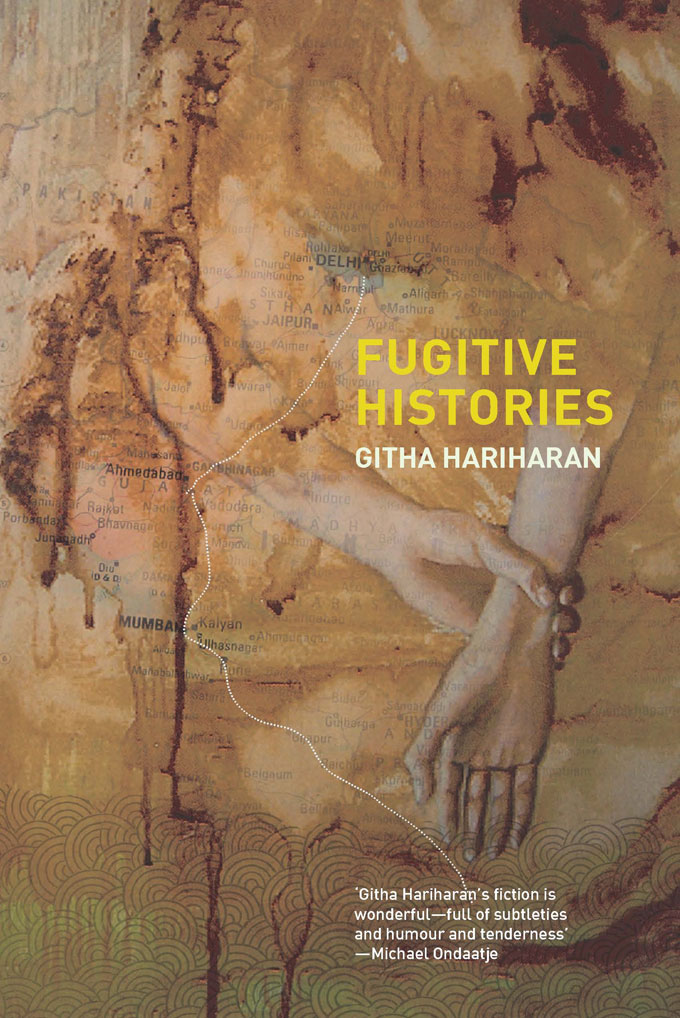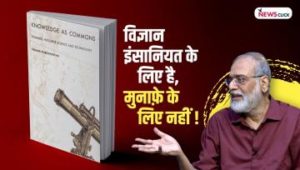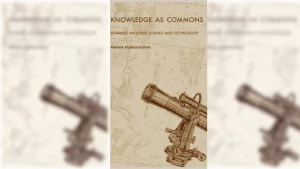
There’s another happy smiling face Sara has to meet in this city, a wrinkled berry of a face with jokey moon-shaped glasses and a smooth bald head, a naked face even a simple child can draw. The face belongs to a man who found it was possible to smile, be happy, in spite of people doing unspeakable things to each other because they are white or brown, Hindu or Muslim, upper caste or lower caste.
Like Akbar, he is now a missing person.
But unlike Akbar, there are more than enough photographs left of him. It’s impossible to forget, even for a minute, what the man looked like.
And unlike Akbar, he became a father before he went missing and was presumed dead. In fact, he might have overdone it. He became a father to far too many people, he fathered a whole swarming nation. This was original of him, it was a canny move; fathers with very large families may get promoted to great souls. But neither his originality nor the size of his progeny was a guarantee that he would always know how to be a father, or how to keep all his wayward children in the fold. Maybe this is why his many children, like any ordinary soul’s children, claim him only when he is not around to embarrass them.
He is not around any longer; only his ghost is, though the ghost is still called Gandhi, even the Mahatma.
The ghost still wears that familiar glorious smile on special occasions. The smile remains wide enough to fit in at least half the world. It’s getting noticeably worn though; from a couple of missing teeth it’s grown completely toothless.
But the rest of the time, the ordinary unsmiling time, it’s a pale, starving ghost.
Why should this ghost look like it’s starving, why should it shudder and grow pale under such a bright, hard-working sun? The ghost has been fed, it’s been well fed by its descendants. It’s been fed with laminated calendars, framed and garlanded photographs and paintings, road signs, rupee notes from five to a thousand, doggerel, bronze and iron statues, shelves of hardbound books, Oscar winning films and banned plays, monuments and memorials, cartoons and politicians’ speeches. The ghost should be fat, it should be a huge gas balloon floating high above the city rooftops as if advertising his brand of wares. It shouldn’t be lurking alone and unhappy, a mere shadow in a villager’s cottage in a shady old ashram.
Maybe it’s dyspepsia that has finally laid Gandhi’s ghost low; he always used to be such a fussy eater, no this, no that. Maybe his children have thoughtlessly or maliciously fed his ghost such quantities of food, so many oily vadas and kababs and so much ghee-laden biryani and silver foil-topped thick kheer, so much junk food, hamburgers and pizzas and bhel puri and French and freedom fries, that he has finally retreated to fast forever at the jail by a river. He’s fasting, it’s only a simple jail, but as usual he can’t resist reminding them he’s their father; he has given this place a grand lesson-teaching name, the Abode of Peace.
When a father fasts, the children get to eat more. When a father fasts, the children make themselves so sick eating his share, the share of the head of the family, that the children are punished with a twinge of conscience in their bloated stomachs. It makes them go looking for the nagging old fool to make their peace with him.
Sara’s been fed titbits of him all her life, she’s been told how to taste him, how to digest him, how to spit him out, how to add not related to when she mentions Indira Gandhi to those unfortunate enough to be outside the extended family. She has had the benefit and the inconvenience of having two fathers, an everyday Asad and a twice-a-year Bapu. But it’s only now, almost a year after her private father has deserted her, that she has found her way to the house of the perennial backup, her public father.
The father Sara shares with her great grandmother Bala and her great grandfather the mulla, with Samar and Akbar and Yasmin, with Rajat and Nina, and even the man on the cruel smoky roof making his way to Yasmin and her Ammi: there’s a rumour going around that this father’s subtle ghost is sulking in its ashram hideout in this city. There’s a rumour he’s come back – though he made a vow not to return to this ashram till he and everyone else had freedom. The rumour is that he is hiding in the city’s token abode of peace, fasting and fasting, refusing to touch a grain of rice or a drop of his favourite goat’s milk. And because he is fasting, he is refusing to share his secret knowledge of how to light fires and douse them; or how to light one fire with one hand, while dousing another fire with the other hand.

Sara is in Sabarmati ashram, more commonly referred to as Gandhi Ashram, for the first time.
It’s a place full of trees — gigantic shade-spreading trees, medicinal trees, flowering trees, ordinary tree-trees. There’s a whole city of birds nesting in these trees, parakeets, koels, tree pies, doves, golden orioles, bee-eaters, sunbirds, munias, bulbuls, mynas, babblers, even drab sparrows and lowly thieving crows. There’s nothing clannish or stay-at-home about these birds; they’re constantly on the move. They dart between trees, always sure of their points of departure and arrival. They swoop down to the river that lies by the ashram in a shrinking border. They settle on it to make an island, try to teach the river that what makes a river is lots of water, flowing water that can hold an island on its belly. They head back to their trees, calling to each other and to the deaf inmates and tourists in the ashram below, fulfilling their part as winged messengers of peace. A barbette perches on its treetop like a green-breasted muezzin and calls out its one-toned message: truth is god, god is truth. A pair of bushy tailed squirrels race down the tree trunk, refusing to listen. But the barbette shrills the message endlessly, it doesn’t care if it’s old hat and it’s been saying the same thing a thousand times a day for years.
In the motherly shade of the trees, below the fluttering city of messengers, there’s a range of low white cottages. They sit undisturbed by the bright red of their pillars, their steps, their tiled roofs. The cottages make up a city in meditation. It’s a wingless city, a city that’s learnt to sit still.
There is no burning courtyard in this city. There are no broken bangles, no broken arms. There are no mutilated or burnt-to-coal corpses in this city. There are no corpses.
Instead there are sweet-sad relics. They evoke only a bland nostalgic affection, not the terror of being hated or the tragedy of hating. That’s because this is a respectable place, this house that makes a home for a great ghost. There’s his pair of spectacles. It’s the kind that a poor old-fashioned grandfather may wear, but it’s still the right power, he could still use them to see. There’s his writing desk, and his Parker fountain pen. He could pick it up anytime if he decides to pick up where he left off, add one more yellowish letter to the reams in the old folio-files hidden in a steel cupboard with double locks. There are those orphaned strips of khadi, lying stiff and useless, but if he decides to soften them with a yellower dye, stitch them together with yarn, it might still make the kind of sari he wove once, a sari fit for a freedom-loving bride. There’s a mat on the floor, a thin cushion, and a spinning wheel that’s taken to idle dreams in its retirement. There’s a modest whitewashed reception room with unpolished stone on the floor. There’s a room nearby for a patient long-suffering wife who has to play Ba at an instant’s notice, to anyone at all, even the great ghost himself. There’s an open-air prayer ground if the ghost wants to hear the soothing strains of Vaishnava janatho or Lead, Kindly Light to help pass the time in his endless afterlife. There’s even a museum, with a library, photo galleries and an auditorium. There are eight life-sized colour oil paintings, an exhibition called My Life is My Message and another called Gandhiji in Ahmedabad. There are 34,066 letters, manuscripts of 8,633 articles, negatives of 6,367 photographs, 134 reels of microfilms of writings, 210 films on Gandhi in the freedom struggle, 30,000 books, 155 letters of felicitation he received, coins, postal stamps and miscellaneous memorabilia.
But where is the great ghost? Even if he’s a ghost, even if he’s a fasting, starving, pale ghost, why isn’t he at home, why isn’t he resting quietly?
Everything inside looks dusty. There’s a smell of mildew despite all the cleaning and locking and worshipping. Maybe the ghost has gone for one his famous walks, maybe he’s learnt to walk without his female crutches, one for each side.
Sara goes outside. She walks past an old man on a mat, spinning by the blue-tiled tank in the compound. He’s so intent on what he is doing that he sees and hears nothing. Sara turns to the thin underfed river, the island of birds, the two bridges, the one to the right a bright Surf blue.
It looks like peace; it could be what peace looks like.
Then a flock of birds rise from the water, screeching; something has disturbed them. For a minute their crazy mix of calls becomes a tape that refuses to stop running in Sara’s head, a tape with too many voices, all the voices of the people she has met in the last few days. The voices of Yasmin and her neighbours; two Muslim university professors; eight Hindu students; two Christian priests; a Muslim auto driver; a Hindu doctor, a Muslim engineer; two Muslim businessmen, a Muslim schoolteacher. The voices have moved into Sara’s head, they have made a squatters’ settlement of stories. Other people’s stories. How did they get stuck in her head, how did they become hers?
The birds take to the air, leave the river to its own devices. Maybe peace is back; it’s silent again, or almost silent, there’s just that one lone squeaky voice singing.
Sara is no longer alone by the riverbank. There’s a ghost sitting there with her. His eyes are shut, he’s singing Ishwar Allah tere naam, sabko sanmati de Bhagwan. The clear little cymbals he uses to keep time fill out his Mickey Mouse voice, sweeten it.
But why did those birds, his messengers of peace, take off, why don’t they sing with him?
They must know it’s no use mouthing the same message today. It’s no use singing at all, because there’s a crowd making its way to the ashram gate.
It’s a diverse crowd. It’s brought together doctors, goondas, housewives looking for god, policemen, real estate agents in search of a killing, priests in search of new converts and ministers in search of votes. But they must have something in common. They have worked hard together, they have just finished with Nasreen’s dargah. They have just lit the matchstick in Zakia’s little boy’s mouth so he can burst like a firecracker. They have just shot Sabiya’s sister as she was drying clothes in her courtyard. They have just finished gang-raping Zainab’s sister as her little son cried. They have just left Zulekha’s girls with stumps of wood in them. They have just given Abeda all those bodies to wash, some of them burnt, others split down the middle. They have just brought down the pipe on Naseem’s arm to leave a cucumber-sized mark. They have just burnt Noorjehan’s husband and father and son. They have just converted Mahrukh’s neighbour’s corpse with kerosene and cremated it.
They should be exhausted or satiated or sick with revulsion, but they’re going strong. It’s time to find the great soul, finish him off properly this time.
The mob is here, they’re in the abode of peace. The birds and the tape that wouldn’t stop running in Sara’s head have gone, but the screeching voices are back, it’s much worse than before. And this time the voices don’t just speak of the enemy, they are the enemy. They can make anything happen and they know it.
The ghost’s cymbals drop to the ground. His song stops though he is not yet done. His voice whispers in Sara’s ear, in the mob’s ear, In the dictionary of satyagraha, there is no enemy. His whisper is too insistent for a ghostly whisper.
“Keep your soul force if you want, you Mian-lover” the mob roars at him. “There’s a more powerful force with us.”
“You may think I’m no match for you,” he says gently. “I don’t have spears, kerosene, flags or soda bottles. I only have a spinning wheel, a pair of cymbals and a few old hymns. And I’m only a ghost now,” he confesses, though he looks far from humble. “But I’ll never give up. The word defeat is not to be found in my dictionary.”
“You talk too much, and you talk too much of dictionaries,” the mob laughs. “We don’t read books. We only worship them, ban them, or burn them.”
“I can’t watch the destruction of all I’ve lived for. I would rather drown myself in the waters of the Sabarmati than harbour hate or animosity in my heart.”
Used up old words, this talk of hearts. They’ve heard it before. “Why don’t you do it then?” the mob taunts him. “Why don’t you drown yourself? It’s faster than fasting.”
The ghost is silent. Who can tell what he is thinking? Of himself, the battle he fought, the battle he loved fighting? Of the freedom that was over almost as soon as it began? Of the battle that’s just beginning, the call to battle he has just heard though it’s come too late, he’s already a ghost? Maybe he has merely taken his weekly vow of silence, a useful vow when questions can’t be answered so easily. And strangely it seems to work. The mob’s steam dissipates for a moment; just then the senile custodians of peace finally hear the ruckus and come to chase the intruders away.
The ghost stands there, looking at the departing crowd, hearing their shouted promises to be back. Sara sees a tear starting in his eye and making its way down his cheek. “This ashram site was full of snakes, but when we built here we didn’t kill a single one,” he says. He sketches a wave at Sara as if to say it’s time to leave, they’ll talk more some other time.
He turns to the river. His tear is gone; there’s actually a mischievous smile on his face as he marches into it, looking for salt there as if it’s not a river but a sea. Then he plunges into the water. He swims away from the bank, the official abode of peace, in the direction of the city.
He’s gone. Maybe he’s even gone back to the fray. He’s a strange and subtle ghost, this one. He fasts and suffers, but he also loves a good fight, even if he’s only fighting with himself. He’s a human ghost, he’s all too human.



